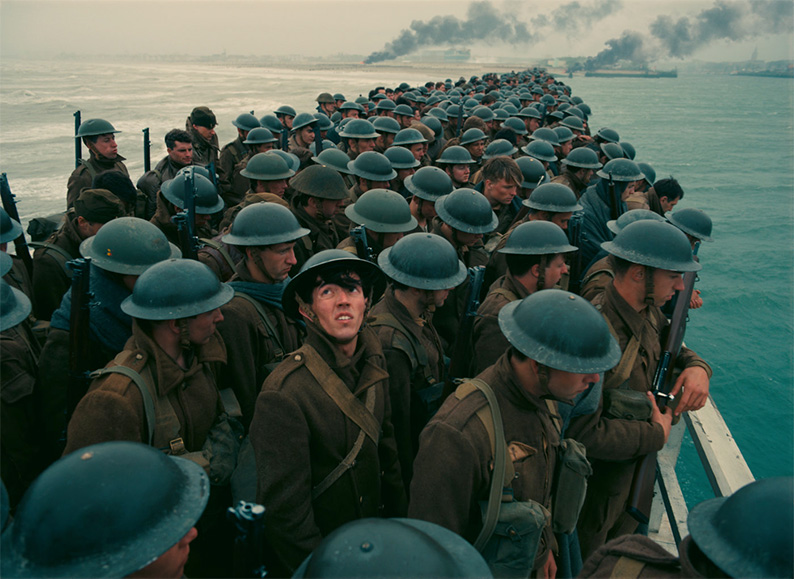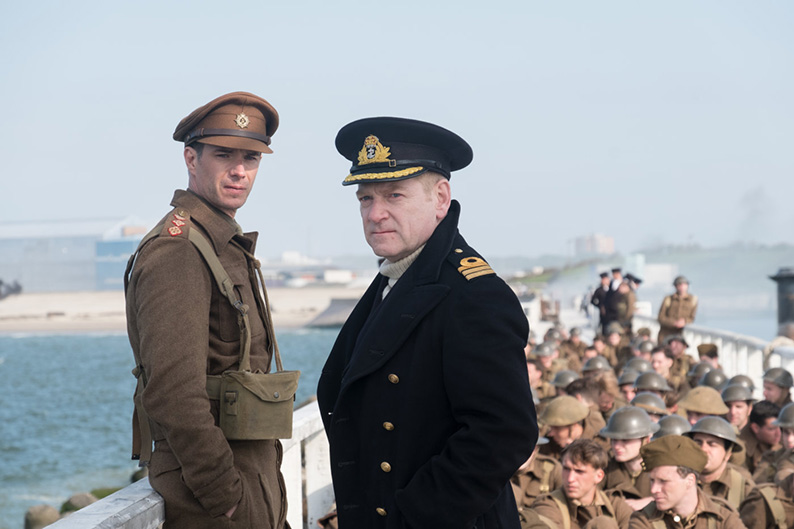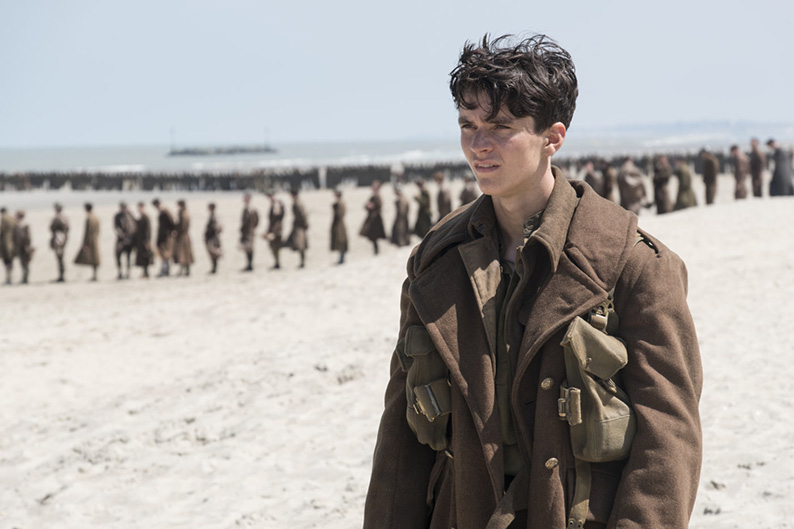| |
“I don't think anyone's ever tried to do aerial combat the way we've done it and photographed it in this film. My DP, Hoyte Van Hoytema, just never gave up. When we would look at how you can't fit a camera in the cockpit and fly the plane, we would build a special kind of snorkel lens and put the camera there. We'd work with the pilot and plane owners to really just go for it, and do as much of it for real as possible.” |
| |
Director Christopher Nolan interview* |
In the film and television industry, as in all industries, there are buzz words, jargon and 'mots du jour' that convince anxious executives that someone, somewhere, knows what they are talking about. The bare and barely acknowledged truth in the film business is not hard to grasp. The bigger the marketing budget, the better the chances of getting people to turn up on that all-important first weekend. After that, it's word of mouth and no one has any control over that, not even 'genius' film directors. I'm reminded that M. Night Shyamalan once said in an interview that he had figured out what Spielberg's secret was as if a bit of prosaic knowledge allowed someone to do what Steven Spielberg does on a regular basis (let's leave the financial performance of The BFG out of this argument). Only the audience makes hits. I still don't understand why smart filmmakers think otherwise. I have a sneaky suspicion that Dunkirk will knock on Skyfall's door in terms of success in the UK. So, the key word in cinema these days is 'immersive'.
Movies must now place you in the location and make you feel like a participant in the drama. Not only is this impossible (most people know they are sitting in a cinema) but it demeans the skill of tempting emotion out of said audience, the entire point of most movies. I laughed out loud twice and shed two tears watching Dunkirk because despite the broad nature of the drama and having no single character to identify with (there are arguably three protagonists all kept at arm’s length) the film engages wonderfully well. The events, which we all know approximate what really happened, are so well realised, it’s our reaction to them and not to the characters where the interest lies. The Times critic Kevin Maher sees that as a fatal flaw. You just have to approach the film as a spectacular survival tale and not rely on normal cinematic empathy. It's not an action film per se. It's action all the way but survival is the name of everybody's game. What can anyone do to achieve that goal while the bombs drop and there's precious little support, is out of their hands. Chips and bombs fall. Where they may.

I was reminded of much-mocked author Dan Brown throughout the film. I'm fairly sure that the modern reader would interpret that as an insult to Nolan. Au contraire. Let's be clear here. Dan Brown does not have a strong reputation as an author of wit, subtlety, or owning an adroit command of the written word but he is one hell of a storyteller, teasing climax after climax at the end of each short chapter of his ludicrously successful novels. Nolan's time bending structure has to toe the same fine line. Each sequence cuts away at moments before any horrific or heroic resolution allowing the 'Air' narrative or the 'Beach' part of the action to butt in. On the whole it works extremely well with me having only one moment of “Where are we? Uh… Oh, I see.” But I will say that the film really delivers on the random horrors of war and the fact that in a split second, one's life could be a scramble for survival after a bomb has dropped or a senior officer has made a stark decision. At one point in the running time I had the emotion of shock, great surprise at understanding a miniscule part of what wrecked and discarded lives did to an individual at close quarters. It wasn't pretty.
Nolan's steady grasp for realism pays real dividends. Not only do I feel I would have a shot at piloting a Spitfire (was anything ever named so fittingly and so well?) but I now have the merest inkling of what goes through a man's mind when the chances of survival are dictated by caprice, luck and the wayward or accurate aim of an enemy soldier. The aerial dogfights are about as real as anyone could imagine (Nolan's camera is bolted to the aircraft's fuselage as it was in Interstellar), the beach scenes believably free of Massive software digital avatars and despite my own robust knowledge of practical special effects, I was at a loss how some shots were obtained without doing them for real. All the obvious digital-pokery had to be employed when men died from explosions and such like but there's not a frame of Nolan's extraordinary film that puts one toe out of sober, dirty, tactile reality. It's a towering achievement at any level of sensible critical evaluation. You come away thinking how extraordinary it was that any man could go through such traumatic experiences and go back to fight.
The Dunkirk rescue took place in 1940. There were five more years of the Second World War to fight but then no one knew that at the time. Part of the emotional effect of the film is not knowing how the Tommies will be tested from one moment to the next so I'm not going to spoil any scenes except one small exchange which made me think that Nolan's writing smarts are solid despite the dearth of dialogue. There are fewer spoken lines in this film than almost any comparable other. When the dialogue comes, it's to the point and propels the narrative but there is one gem I have to highlight. A person has just been through a life-threatening situation and almost died. With help from a young man on a boat, he is rescued. As he holds on to the object that rescued him, he looks up at the young boy and says “Good afternoon!” Just simply, lovely. At this point I became convinced that Dunkirk was Nolan's love letter to the British Isles… This is the strength of this story. It damn well makes you feel proud to be geographically associated with all those little boats that came to lend a hand.

The cast is uniformly (see what I did there?) excellent. Fionn Whitehead is Tommy (OK, of course he is), the sole survivor of enemy snipers who gets to the beach and discovers what he's just been through may be preferable to what he's going to have to go through to get home or even just survive. Harry Styles is terrific as a Tommie who teams up with Tommy to lead us through their horrific ordeals to get home. I find it utterly unbelievable that Nolan wasn't told who Harry Styles was. The studio-sanctioned shtick is that he was picked from hundreds of candidates for the role. I'm too cynical to think that someone from the studio didn't clock Styles, recognise him and thought “youth demographic…” Kenneth Branagh is the Naval commander with an upper lip stiffer than rigor mortis (he gets the big emotional pay off line). A favourite of mine after his roles in Broadchurch and especially Agent Carter is James D'Arcy playing the army liaison with some reserve and humility.
I thought I recognised the voice of Nolan regular Michael Caine instructing the Spitfire pilots on their mission. Tom Hardy plays Farrier (names and quite a few words were not easily discernible watching – and listening - to the film. It's a complex mix). He's a Spitfire pilot who commits himself to defending the evacuating soldiers despite his dwindling fuel supply. Hardy must have the strangest of tastes in scripts. His first question must be “Will my face be covered up in the movie for most of the running time?” Think of Bane in The Dark Knight Rises. Obviously George Miller, director of Mad Max Fury Road got Tom on board by promising that his face would be covered by a trowel for the first third of the movie. Just researched… There are memes on this subject. Cillian Murphy plays a traumatised survivor of a U-Boat attack and the last thing on his mind is sailing right back to hell. Mark Rylance is the stout and dependable skipper of a civilian boat that joins the rescue attempt. He has hidden tactical depths but he also represents what every decent man would do for his fellow man. He's a great Briton.

I saw the film at a modest local cinema but would urge anyone to seek out the biggest screen they can find to witness this amazing work in the IMAX context for which it was conceived. Due to ill luck and a malfunctioning digital projector, a lot of the shots with more light that shade in them strobed as if shot in front of a spinning propeller. This unfortunate effect kicked in twenty minutes from the off and I have to say, it continued to take me out of the movie every five minutes or so. I hope you're not that unlucky. There's another one odd thing that I had to put quickly behind me. There are three titles and subtitles that introduce the three temporal and narrative strands of the narrative. The first is 'The Mole' (we are not given any more information but left to assume this is the beach from where everyone's waiting to be picked up). Beneath this title are the words 'one day'. The other two ('The Sea' and 'The Air') are perfectly understandable but it's that 'one day' subtitle on all three that had me scratching my head. Was there a toss up between 'one day' and '24 hours'? I would have favoured nothing at all. The narrative is so well woven and cut that despite time jumps, you're never really in the dark, structure wise. 'One day'… Hmmm.
The cinematography is stark and comprises mainly of several delineations of aqua marine. The sky and sea are the primary colour players in more than eighty per cent of the frames. Hans Zimmer's tense and weighty wall of score has seemingly none of the subtleties of his work on Inception or Interstellar (am listening to Dunkirk's score as I write). There are nods to Elgar woven into the score at the climactic places and another composer is credited for the coda cue and the end titles, Benjamin Wallfisch. But I will cut it some slack as it does the job of ratcheting up the tension superbly well. And what is the role of a film score? To eke out the emotional response and there is no question that there are moments in Dunkirk that deprive you of a percentage of your fingernails. But where Dunkirk technically delivers most successfully is the sound design. Yes, Zimmer's score is part of that over all melange of sound but the dynamic range, so narrow on TV and most movies, is stretched at the movies. Here a gunshot (particularly through the hull of a boat) sounds as loud and as shocking as it might in real life.
In conclusion, Christopher Nolan may not be the next Stanley Kubrick but he is certainly the first Christopher Nolan, operating at a level of verisimilitude that I, for one, find refreshing and exciting. I heartily recommend the movie at the level of a survival drama with unmatched special effects (which I can't talk about because I couldn't figure out exactly what were special effects). Roll on the next issue of Cinefex. Those with an interest in history, action cinema, a cracking yarn or being British should revel in Dunkirk's many pleasures.
|